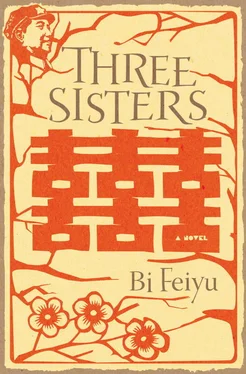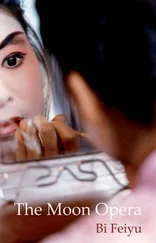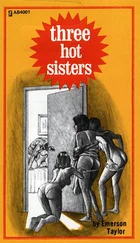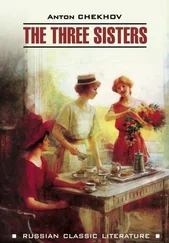“To execute” was the homeroom teacher’s favorite expression; it denoted a grand, decisive tone that conveyed a sense of power and authority. When he uttered the phrase, he sounded unwaveringly resolute, as if the culprit would be shot on the spot and the problem solved. Or he might execute a class representative who failed an assignment. Who doesn’t fear being executed? His temperament demanded that he execute Zhao Shanshan as soon as possible because the brassy girl, bolstered by her belief that she was the backbone of the class’s arts and cultural activities, was nearly out of control.
During the selection process for choral director, he had tested Zhao. Knowing that he preferred Pang Fenghua, Zhao insisted on Hu Jia’s being the director, going so far as to say that there was a problem with Pang’s deportment.
What kind of talk is that? What does she know about deportment anyway? Ridiculous. Absurd. His face darkened to show his displeasure. So Shanshan was out as a member of the committee for cultural activities, and when the contest was over, he’d have to execute her.
The music teacher was very accommodating, and Section Three’s choral practice at the warehouse was taking shape. The forty-eight students were lined up in four rows representing the four vocal parts; the separate vocal sections intersected, corresponded, and contrasted with each other to produce a musical performance with such depth and breadth that it seemed created, not by forty-eight students, but by thousands of singers. It was the unified strength of a social class; better yet, it was the unified strength of a nation that was permeated with the intensity of boundless hatred and bottomless anger mixed with the flames of struggle and resistance. Standing off to one side, the homeroom teacher pulled a long face as he hugged his elbows and stood as straight as a javelin about to be hurled. He was happy, but he kept gnashing and grinding his teeth; that, of course, might well have been the effect that the singing had on him. In art, hatred and anger are infectious; that is what art is all about.
When the music teacher was done with his work, the homeroom teacher sought the assistance of the dance teacher in an attempt to “replace the old with something new.” The dance teacher added a bit of choreography and some standard gestures, such as a sudden clapping of the hands or the abrupt thrusting of fists into the air. The addition of this high-spirited movement to the resonating tempo gave the song a rhythmic flair that elevated its power; the performance now exuded a dauntless, do-or-die quality. The dance teacher’s ingenuity was fully displayed in the lyrical segment when he asked the students to stand with their feet apart and let their arms hang to their sides, their balled fists turned inward. With their chests thrust out, they swayed from side to side as they shifted their weight from one foot to the other. Though their feet were firmly planted on the floor, they looked as if they all were forging their way through fire and water together. And yet the gentle movement, done with juvenile clumsiness, evoked a tender feeling, like willows in a spring breeze do, and conveyed a deep affection, a longing, and a tribute to the motherland. These winsome actions, executed in a uniform manner, were breathtakingly beautiful.
But most of the boys were too shy to make the necessary gestures, and as they were trying not to laugh, the do-or-die determination was lost. Several practice rounds fell short of the desired results. The athletic committee member, a tall, strapping student, was the worst, for he came across as especially bashful and awkward when he balled his fists and swayed back and forth.
“Sun Jianqiang, watch what you’re doing,” the homeroom teacher shouted.
As a smile crept over his face, Sun Jianqiang looked as if he’d rather die, and that made the teacher redouble the severity in his voice. “Sun Jianqiang!”
That effectively brought the practice to an abrupt end and stopped the swaying of the willows in the spring breeze.
“What’s wrong with you?” the teacher asked, glaring at the boy.
“Can’t we scrap this? It’s hard to do and it’s ugly,” the student said.
As his face darkened, the teacher ordered, “Get over here.”
So Sun Jianqiang stepped out of the formation and did not pass up the opportunity to make a face at Pang Fenghua along the way, which did not go undetected by the teacher. Since he always made a point of passing the ball to the teacher whenever they played basketball, the boy did not take the teacher’s annoyance all that seriously. He knew how to deal with the teacher; they were like friends. So he walked up and struck a casual pose, rocking back and forth to express his “I don’t care” attitude.
“Tell me, what do you mean by ugly?” the teacher demanded.
“It’s too girlish and sissy-looking,” Sun said with a red face. The boys laughed; so did some of the girls. The homeroom teacher sent a look to the music teacher that really was ugly before he turned around and roared at Sun, “Get out.” He pointed to the warehouse door.
Momentarily taken aback, Sun realized that he’d been executed, and the loss of face was more than he could bear. He spun around and walked off, pointlessly muttering something under his breath. The teacher pointed a finger at the boy’s receding back like a pistol—the coup de grâce for Sun Jianqiang. The teacher screamed, “You’re no longer on the athletic committee. And don’t ever come back here.”
Now that Sun was out, there was a gap in the chorus line, and as the teacher continued to fume, the singing practice came to another halt. Facing the chorus as the conductor, Pang Fenghua signaled the teacher with her eyes, asking what to do about the empty space. The Section Three students were well aware of the teacher’s decisive nature; he meant what he said and said what he meant. It would be impossible for him to backtrack now, especially since the outburst had occurred in front of the whole class. With his hands on his hips, he walked over to Fenghua.
“Keep practicing,” he said. He was still angry, but it was clear that he was thinking as his eyes lingered on the empty space left by Sun Jianqiang’s departure.
The students started up again; after gesturing with their hands, fists, and elbows, they began to sway to the left then to the right. They swayed with renewed effort, but without producing the desired effect. The earlier harmonious motion could not be recaptured, and with it went the imposing air and the spirit of resolve. The teacher’s eyes swept over each student’s face before landing on Yuyang, whose awkward movements were lackluster at best. With her eyes downcast, she looked ashamed; not only did she fail to look off at a forty-five-degree angle with deep longing, as required by the choreography, but she bit her lip. And she forgot to sing.
The teacher walked up, grabbed her by the elbow, and yanked her out of the formation. Then he gestured for the remaining students to close up ranks, returning symmetry to the chorus and filling Sun’s space at the same time.
“Good, very good. Now you’re making progress. Keep it up,” he said, clapping his hands and sighing happily.
With two students having been “executed,” the rest of the team increased their spirit and morale; they raised their voices as the veins bulged on their necks. From where he stood behind Pang Fenghua, the teacher also began to gesture, a sort of de facto conductor. Yuyang remained off to the side, knowing that she’d been executed but unsure of what to do now. So she just stood there stiffly, hoping for something to happen.
Afraid that the teacher would give her the coup de grâce, she made sure that she didn’t turn her back on him, but she didn’t want to stay where she was, either. That was just too awkward. She seemed to be waiting, but in vain, since the teacher had no intention of letting her rejoin the chorus. He’d forgotten all about her. So there she stood, biting down on her lip, her eyes downcast. And then she made an accidental discovery: The ugly round tips of her cloth shoes looked horribly unsophisticated. Taking two steps back, she tried to hide her shoes, but to no avail. Now she was truly ashamed, ashamed of her countrified appearance. Luckily, she was no longer the dumb little girl she’d once been, and she knew how to get out of this. She walked up to the teacher. “Teacher, I don’t feel well. May I be excused?” He was too engrossed in his conducting to hear her, so she repeated, “Teacher, I’d like to be excused.”
Читать дальше











